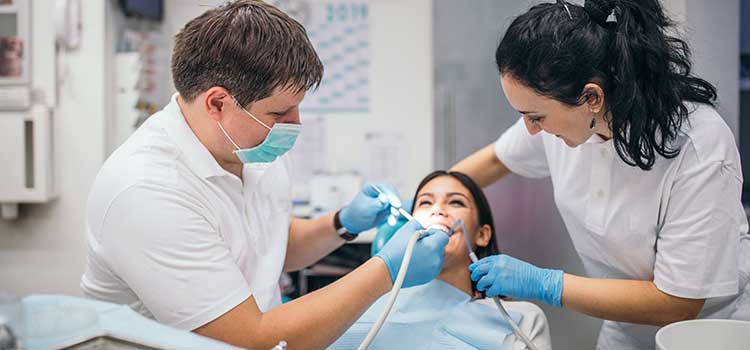In this Article

Although some dental assistants get started with on-the-job training, you can also pursue a formal education through a certificate program or an associate degree to become a certified dental assistant (CDA) and boost your career prospects.
Dental assisting is one of the leading healthcare support jobs in the U.S., according to a 2021 U.S. News & World Report survey, which ranked the role at #25. Because dental assistant training is relatively quick to complete, it’s an especially appealing choice for nontraditional students and those who want to make a career change.

Because dental assistant training is relatively quick to complete, it’s an especially appealing choice for nontraditional students and those who want to make a career change.
Steps to Become a Dental Assistant
Use these steps as a guide to pursue a career as a dental assistant.
Decide if being a dental assistant is right for you.

Connect with professional dental assistants in your dental office or through dental assisting schools and professional organizations. Ask about the duties they perform, what they like and dislike about their jobs, and whether you can shadow them for a day.
Determine the educational path that works best for you.

Compare the advantages, disadvantages, and costs of on-the-job training, a certificate program, and an associate degree to help you decide how you’ll learn the skills needed to qualify for this role. If you’re pursuing a formal education, attending a program accredited by the Commission on Dental Accreditation (CODA) qualifies you to take the CDA certification exam upon graduation.
Gain experience in the field.

With your education, you’re prepared to pursue work. Your formal training can also increase your employment options and salary potential.
Consider earning certification to help you stand out from the competition.

As you become more involved in dental assisting, consider earning certification in a specialty area of care to enhance your skills and increase your career opportunities.
What Does a Dental Assistant Do?
Dental assistants can work in a variety of settings. They typically start their day by preparing each dental room, ensuring supplies are fully stocked, and setting out patient charts and X-rays. Dental assistants need to be comfortable juggling several tasks at once since more than one patient is treated at a time.
States regulate the tasks that dental assistants can perform. Depending on the state, a dental assistant may be allowed to:
- Apply fluoride to prevent cavities
- Perform coronal polishing to remove plaque
- Apply sealants and other anti-cavity treatments
- Apply topical anesthetics to numb areas of the mouth
Dental Assistant vs. Dental Hygienist
While dental assisting and dental hygienics may appear to be similar roles to those outside the dental industry, they are actually two distinct jobs.
Dental Assistant Education: Degrees and Programs
You’ll need to complete a certificate program or earn an associate degree to learn the skills necessary to be a dental assistant. In some cases, on-the-job training can be an option.
Most dental assisting programs take nine to 11 months to complete and lead to a diploma or certificate. Associate degrees take two years to complete and include core classes such as English composition, math, and humanities.

You’ll need to complete a certificate program or earn an associate degree to learn the skills necessary to be a dental assistant. In some cases, on-the-job training can be an option.
Classes You’ll Take in Both Programs
Equipment You’ll Learn to Use
What’s the Difference Between a DA Degree and Certificate?
Certificate
- Shorter program
- Classes are focused solely on dental assisting
- Offered at community colleges
Associate Degree
- Longer program
- Classes include liberal arts and more in-depth dental assisting topics
- Offered at community colleges
Where to Find Dental Assistant Programs
There are a variety of dental assistant training programs available—including full-time, part-time, accelerated, and online options—so you can likely find a program that fits your busy schedule. Here’s where you’re likely to find programs:
Program Accreditation
Once you’ve identified some nearby programs, check to see if they have the accreditation you may need in the future. CODA maintains an online database of accredited dental assisting programs by state. These programs will allow you to qualify to take the CDA exam to earn a national certification.
Do I Need Certification?
State regulations vary on certification. Some require dental assistants to be certified, while other states do not have any formal educational requirements.
However, earning a CDA can help your career in more ways than one. A certification can allow dental assistants to perform more advanced duties in some states. Becoming a CDA can also help demonstrate to employers that you are dedicated to the career and embrace high standards of patient care.
A Certification Could Boost Your Salary
The Dental Assisting National Board (DANB) is the certification agency for dental assistants. In the U.S., more than 37,000 dental assistants are currently certified through the board.
The board’s 2020-2021 Dental Assistants Salary and Satisfaction Survey indicates that dental assistants who hold a CDA certification earn around $2 more per hour than the BLS median salary.
In addition, CDAs often receive other benefits such as paid time off and employer-sponsored retirement plans.
Certificate vs Certification
- Certificate
- A certificate is awarded by an educational institution, and signifies that a student has satisfactorily completed a given curriculum. Certificate programs can help students prepare for certification exams.
- Certification
- A certification is generally awarded by a trade group after an individual has met certain professional requirements (e.g. earned a specific degree, worked professionally in a given field for a set amount of time, etc.) and passed a certification exam.
In short, a certificate is evidence that someone has completed an educational program, while a certification denotes that someone has met a certain set of professional criteria and/or passed an exam.
Not all programs offered are designed to meet state educator licensing or advancement requirements; however, it may assist candidates in gaining these approvals in their state of residence depending on those requirements. Contact the state board of education in the applicable state(s) for requirements.
Is a Registered Dental Assistant (RDA) the Same as a CDA?
CDAs and RDAs are two different titles for dental assistants. CDAs hold a national certification through the DANB, while RDAs must meet state-specific requirements.
RDA status does not automatically transfer from one state to another, because each state has its own rules and regulations. For example, some states may require you to be certified in CPR, complete a specific series of dental assisting courses, or pass a state dental assisting exam to earn status as an RDA.
However, some states do not recognize RDA status at all. In fact, there are many different titles for dental assistants in various states.
In Colorado, for instance, you can be recognized as a dental assistant or expanded duties dental assistant (EDDA). In Washington state, there are three official levels of dental assisting: registered dental assistant (RDA), expanded functions dental auxiliary (EFDA), and dental anesthesia assistant. All of these titles have different requirements and scopes of practice outlined by state regulations.
The DANB provides a state-by-state guide to explain the requirements and titles available in each state.
Is Continuing Education Important?
Even after you land a job as a dental assistant, you can still benefit from continuing education to stay current in the field, maintain a certification, or comply with state requirements.
To maintain a national certification through the DANB, you will need to earn continuing dental education (CDE) credits every year. You can do this in person or online. You will also need to hold a current CPR certification and pay a renewal fee. The amount of the renewal fee varies, depending on the number of credentials you’re renewing.
Applying Coursework to a Dental Hygienics Program
If you earn an associate degree in dental assisting, you may be able to transfer some credits to earn a bachelor’s in dental hygiene. This will depend on a school’s credit transfer policies.
Even if you are unable to transfer academic credits, you will still have the advantage of knowing the ins and outs of a dental office work environment before starting a career as a dental hygienist. Plus, your previous work experience could position you as a more competitive job candidate.
Dental Assistant Salaries
According to the BLS, dental assistants earn a median salary of $46,540 per year. But there are many factors that can play a role in salaries, including where you live.
Dental assistant salaries vary across the country. Here are the highest-paying metropolitan areas:
Wavering between dental assistant and another medical career? Here’s how salaries for dental assistants compare with some other careers in healthcare, according to the BLS.
Dental Assistant Job Growth
There’s great news for aspiring dental assistants. The BLS predicts employment will grow 6.9% through 2032. This is faster than the average for all occupations. In plain numbers, the BLS predicts over 23,000 dental assisting jobs will be added during that time.
There are a couple of reasons for this. Research has linked a person’s oral health to their overall health. Poor oral health, especially gum disease, has been linked to conditions including heart disease, diabetes, and stroke. Plus, baby boomers are living longer and will need dental care longer than previous generations.
What Personality Traits Are Helpful?
Dental assistants, hygienists, and technicians all play a critical role in the workflow of a dental care facility. Among these three roles, responsibilities and duties might vary, but each involves helping dentists keep their practices running smoothly. Here are traits that can help you succeed as a dental assistant.
You are:
You should have:

Written and reported by:
Anna Giorgi
Contributing Writer